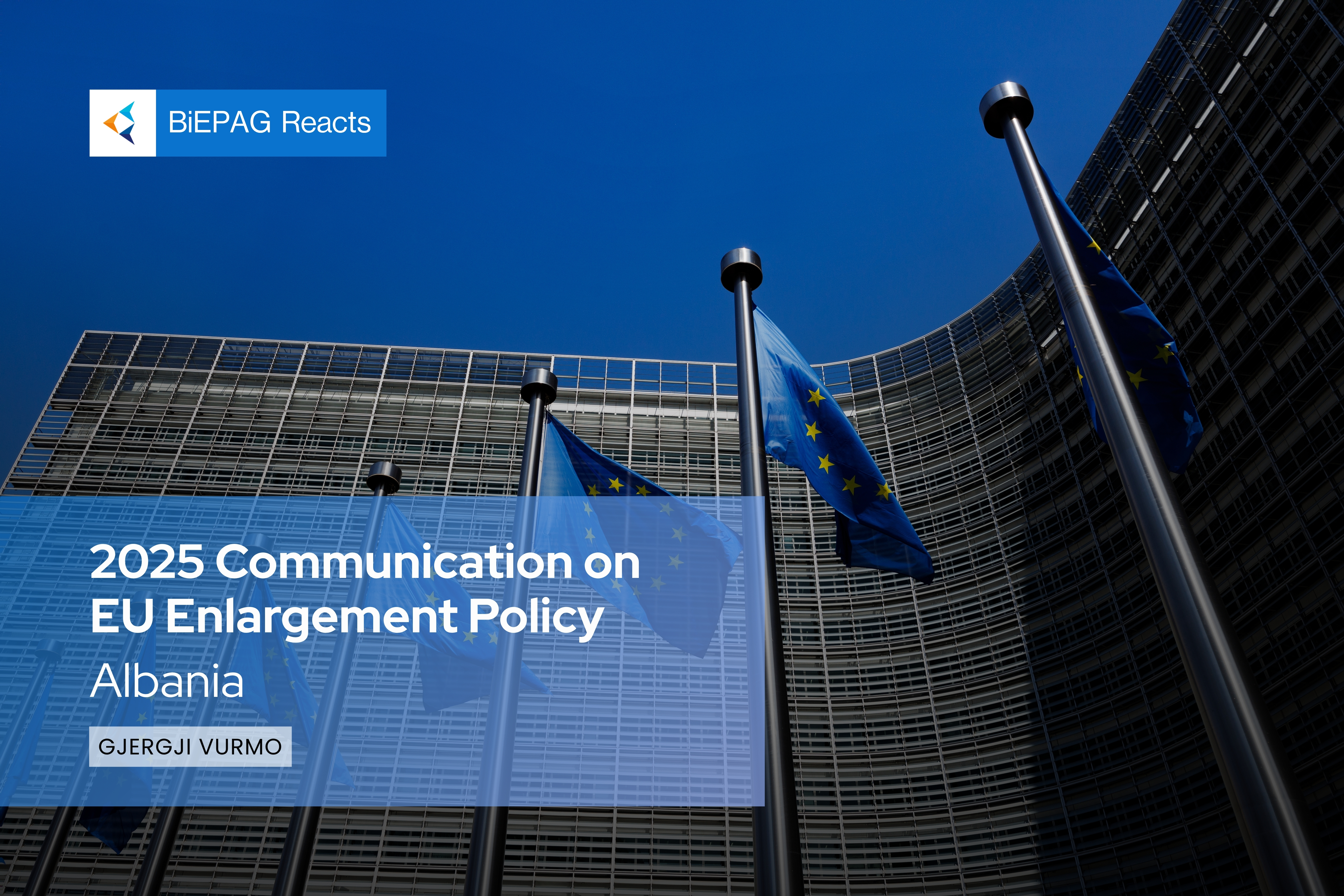

“Ambitious, but doable” — that is how Edi Rama, four-time Prime Minister of Albania since June 2013, describes the country’s goal of concluding accession negotiations by the end of 2027 and achieving full EU membership by 2030. Indeed, 2025 marks a significant acceleration in Albania’s EU accession process. Following the October 2024 Intergovernmental Conference, which opened talks on Cluster 1 (“Fundamentals”), Albania managed to open four additional clusters within a single year, representing its most substantial progress toward EU membership since negotiations began in 2022. This momentum reflects the EU’s renewed political commitment to enlargement, which, in Albania’s case, constitutes a “once-in-thirty-years” opportunity — one the country cannot afford to miss, as it did in the mid-1990s.
The European Commission’s 2025 report on Albania presents a picture of a country making decisive strides on its European path. At the same time, it highlights persistent challenges in public administration, media freedom, and corruption prevention — areas where longstanding shortcomings continue to be reported year after year.
Albania has become one of the first Western Balkan states to operationalize the EU’s Growth Plan for the region. Performance-based EU funding is now being channeled directly through this mechanism, linking domestic reforms to EU financial conditionality. Economic indicators have reinforced this momentum: inflation fell below target after two years of global volatility, while GDP growth, fueled by tourism and foreign investment, remained among the highest in the region. Albania’s formal accession to the Single Euro Payments Area (SEPA) has further integrated its banking sector with the European financial system. These achievements stand in stark contrast to the 2024 report, which described Albania as “fragile” and “partially prepared” on most economic benchmarks.
Judicial reform marks another landmark achievement for Albania. The 2025 report confirms the completion of the vetting process for all first-instance judges and prosecutors, a process that began in 2016. The Special Anti-Corruption and Organized Crime Structure (SPAK) continues to produce results against high-level corruption and organized crime, although the country’s capacity to generate grand corruption still outpaces its ability to punish it. Nevertheless, improvements in asset recovery mechanisms, cross-border cooperation, and prosecutions involving senior officials signal the emergence of a more mature rule-of-law ecosystem.
Several long-delayed governance frameworks finally materialized in 2025. The Public Administration Reform Strategy (2025–2030), the Anti-Corruption Strategy (2024–2030), and the Medium-Term Revenue Strategy (2024–2027) were all adopted, offering a coherent roadmap for institutional reform and fiscal management. Digitalization, an important “bet” of the Government which now includes a virtual minister in its cabinet, also advanced with the adoption of the Cybersecurity Strategy 2025–2030 and the new Law on Electronic Communications. While incremental, these measures represent concrete steps toward alignment with the EU’s Digital Europe framework.
The Stagnant Core: Politics, Administration, and Freedom of Expression
Yet for all these advances, the 2025 report makes clear that many of Albania’s core governance problems remain structurally unchanged. The tone may be slightly more optimistic than in 2024, but the underlying message is consistent: Albania’s institutions are moving forward formally, while their democratic quality and accountability remain stagnant.
Despite a return to more regular parliamentary functioning after years of boycotts, the political atmosphere remains deeply polarized. The May 2025 parliamentary elections were competitive and well-administered, yet the Commission again found evidence of unequal campaign conditions and misuse of public resources. Parliament’s oversight over the executive continues to be described as “limited,” and cross-party dialogue remains elusive.
Public administration reform: Meritocracy still in limbo
The 2025 report again rates Albania as “moderately prepared” with “limited progress” in public administration. Despite new strategies, the Commission found persistent politicization of appointments, weak monitoring of reforms, and insufficient transparency in budget management. The excessive use of normative acts to revise budgets, a practice criticized in multiple past reports, remains common.
In a nutshell, the strategic framework has improved, but the civil service culture has not—a telling example of Albania’s reform paradox: progress in form, inertia in substance.
Media freedom: A chronic deficit
Perhaps the most enduring area of stagnation is freedom of expression. The 2025 report uses nearly identical language to its 2024 counterpart: media concentration, opaque financing, and intimidation of journalists continue to compromise pluralism.
While the government launched a dialogue with media organizations, the decriminalization of defamation and the transparency of media ownership – key EU demands – remain unaddressed. Working conditions for journalists are precarious, and violence against media actors still goes largely unpunished.
Justice and Rule of Law: Depth versus breadth
Although judicial vetting is complete, the quality and efficiency of justice remain problematic. Court backlogs persist, budget shortages delay the rollout of the Integrated Case Management System, and political influence in judicial councils continues to raise concern. Moreover, while SPAK’s prosecutorial work has advanced, preventive mechanisms against corruption remain weak. The 2025 report highlights limited progress on integrity checks, asset declarations, and risk assessments in vulnerable sectors such as customs and property management. Albania continues to perform well in investigation, but poorly in prevention, a structural imbalance that constrains long-term reform credibility.
Across many chapters of the EU acquis – from competition and statistics to public procurement and company law – the Commission repeats the phrase “recommendations from last year remain largely valid.” This formula, scattered throughout the 2025 report, encapsulates Albania’s enduring challenge: the machinery of alignment is active, but its gears turn slowly. Albania has crossed the procedural threshold of accession but has not yet crossed the substantive threshold of transformation. To move from compliance to credibility, 2026 will need to be the year when the institutions not only function, but earn the trust of their citizens.